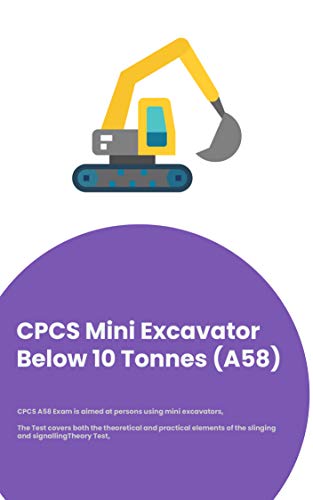Excavators, often the workhorses of the construction industry, are integral to various forms of heavy-duty work, from demolition to landscaping. Given the complexity and scale of tasks they handle, the question often arises: are excavators hard to learn? The straightforward answer is that while the basics can be grasped relatively quickly, mastering the intricacies takes time and experience.
Do You Need Training to Use an Excavator?
In the UK, you certainly do need training to operate an excavator. It’s not merely a matter of “jumping in and having a go.” This is not only for your safety but also to ensure the safety of those around you and the efficient operation of potentially costly machinery. Training programmes are designed to familiarise operators with the equipment and instruct them on best practices.

This book is designed for people with limited or no experience who want to learn to pass CPCS test and operate Mini Excavator Below 10 Tonnes A58.
“Training is not an option but a necessity when it comes to operating heavy machinery like excavators.”
Types of Training Available
- On-site Training
- Virtual Training Programmes
- Apprenticeships
- Short Courses from Accredited Providers
Required Qualifications
In the UK, it is advisable to have a Construction Plant Competence Scheme (CPCS) card or a similar qualification from another accredited body. Some organisations may also require specific certifications for operators using their machinery.
| Qualification | Duration | Cost |
|---|---|---|
| CPCS Card | 1-2 weeks | £500-£1500 |
| National Vocational Qualification (NVQ) | Several months to a year | £1200-£3000 |
The Learning Curve: How Long Does It Take?
The amount of time it takes to learn to operate an excavator varies from person to person. While the fundamentals can usually be picked up within a few hours of hands-on training, achieving a level of proficiency will take considerably more time.
“Learning to operate an excavator is much like learning to drive. You can learn the basics quickly, but mastering the skill takes practice.”
Factors Influencing the Learning Curve
- Prior Experience: Those with experience in operating heavy machinery will likely have a shorter learning curve.
- Quality of Training: The better the training programme, the quicker you’ll grasp the essentials.
- Personal Aptitude: Some people naturally take to it faster than others.
Operational Challenges: What Makes it Difficult?
While excavators are built to be user-friendly to some extent, there are operational challenges that can make them difficult to master. These include:
- Coordination: Operating the different parts of an excavator simultaneously requires excellent hand-eye coordination.
- Environmental Factors: Working in challenging weather or terrain can add a layer of complexity.
- Task Complexity: Certain jobs require precise movements that can only be executed by skilled operators.
“An excavator is only as good as its operator. The skill of the operator determines how efficiently and safely the machine will be used.”
Conclusion
While the fundamentals of operating an excavator can be learned relatively quickly, becoming proficient is a different matter altogether. With mandatory training and qualification requirements in the UK, the industry ensures that only competent individuals operate these complex machines. It might not be rocket science, but it’s certainly not child’s play either. Like any skill, it takes time, practice, and a good training programme to master.


